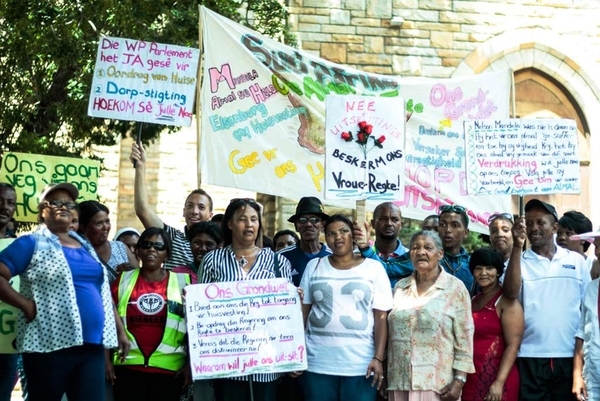“If I move out, where will I go?,

Residents of houses on a state farm in Stellenbosch will hear next year whether the Western Cape High Court will grant the provincial Department of Transport and Public Works an order to evict them.
The department has applied for an eviction order against several families living on the Vaaldraai farm in the Boland. The families were told in July that they must vacate their houses which are needed to house state employees who work in the area.
This week the court postponed the matter until February 2016.
The houses on the Vaaldraai farm and several other state farms in the area are managed by the provincial Department of Transport and Public Works. According to a letter from Joyene Isaacs, Head of the provincial Department of Agriculture, received by GroundUp on 29 October, the housing is required for state employees who have to work after hours, weekends and public holidays.

Wendy Pekeur. Photo by Tariro Washinyira.
Residents protested outside the court last week. The chairperson of Vaaldraai Community, Wendy Pekeur, said she would not move out.
She claimed the department was in breach of an agreement in 2008 that the occupants would get ownership of the houses.
“This is the only home I have known for 37 years and I do not have anywhere to go. My great grandmother is buried there in Vaaldraai. She worked for the state. Before my grandfather, Themba Mandidi, died in 2011 he said I should stay here and look after the house.”
“He worked for government for 46 years. When he retired in 1994, he got a retirement benefit of R8,000. During his service time he used to earn R800 per month. They discriminated against him because he was a black man who migrated from the Eastern Cape. In 1990 they threatened to evict him but the community fought for him. Today they want to evict his family.”
“He died a sad man, always worrying what would happen to us when he died. Did they expect him to buy a house with R8,000 when he retired?”
She said it was unfair that the residents were expected to pay market-related rent on the farms. Most of the families were paying R1,900 a month, Pekeur said.
Pekeur complained that the houses were not well maintained, the geysers did not work, water taps leaked and walls needed painting. But Isaacs said the houses on these and other farms were ‘vandalised regularly’ and that the province spent over R1 million a year on maintenance and repairs.
According to Isaacs, 48 households on several farms are affected by the dispute. Of these, in 29 cases, ‘individuals were either dismissed from or left the state’s employ or were previously living with a lawful occupier who themselves, no longer live in the house.’
‘These are now private occupants, who are effectively preventing the Department of Transport and Public Works from allocating these homes to the Department of Agriculture so they may be used by state employees.’ Isaacs said the remaining 19 were ‘persons occupying houses by virtue of their connection to the deceased officials that were previously employed by the Department of Agriculture.’

Eunice Mathiusen. Photo by Tariro Washinyira.
A 60-year-old pensioner, Eunice Mathiusen, received a notice of eviction in July. She said she was born at Elsenburg farm and continued staying there when she got married. She said she had been living in the house for 27 years with her late husband who had worked at the same farm.
She said, “Life is already hard for me. I am working three days a week as a childminder and get paid R50 per day. My pension is R1,410 monthly. I then pay water and electricity for R300. If I move out of that house where should I go? I cannot afford to pay expensive residential rent here in Stellenbosch.”
Ben Nkanyane said he had also been staying in his house for 27 years and was worried about his family.
Isaacs said some of the residents could be protected by the Extension of Tenure of Security Act, if they had lived there for ten years or more, were 60 years old or older, earned less than R5,000 a month and had a verbal agreement with the department.
She said the Department of Transport and Public Works, as the custodian of state owned property, had “on several occasions” attempted to engage with residents to assess each case and had asked all the residents to complete a survey in 2014 . Some had not done so.
Letters had also been sent to all the residents informing them of rent increases.
Next: Snakes in the classroom
Previous: Woodstock mural

This article is licensed under a Creative Commons Attribution-NoDerivatives 4.0 International License.


